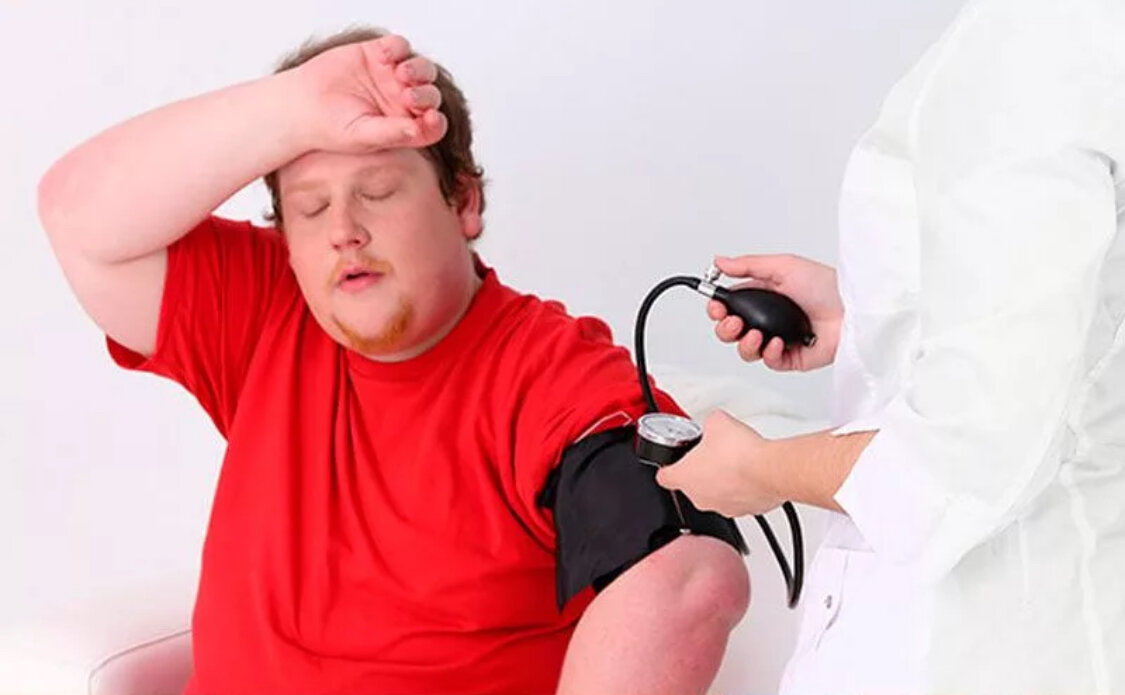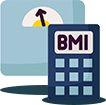Being Overweight Doubles Your Chances of Having a Stroke
Updated on March 28, 2024
Medically reviewed by Huma Sheikh, MD
Research shows that being overweight more than doubles your chances of having a stroke. Much of this has to do with how excess weight places stress on your heart and affects blood flow.1
By losing weight and choosing healthy lifestyle habits, you may significantly reduce your risk of stroke. This article discusses the connection between stroke and being overweight, along with heart-healthy tips that can help you lower your risk.
What Is Overweight?
Doctors determine if someone is overweight by measuring their body mass index (BMI).

Your BMI tells if you are:2
- Underweight: Your BMI is less than 18.5
- A healthy weight: Your BMI is between 18.5 and 24.9
- Overweight: Your BMI is between 25 and 29.9
- Obese: Your BMI is 30 or higher
- Morbidly obese: Your BMI is 40 or higher
Body Mass Index (BMI) is a dated, flawed measure. It does not take into account factors such as body composition, ethnicity, sex, race, and age.
Even though it is a biased measure, BMI is still widely used in the medical community because it’s an inexpensive and quick way to analyze a person’s potential health status and outcomes.
You can figure out your body mass index by dividing your current weight in pounds by your height in inches squared. The result of that calculation is then multiplied by 703 to get a number that is usually between 14 and 40.
You can do the math yourself or you can use a calculator to calculate your BMI.
Learn Your Body Mass Index (BMI)
Stroke Risk Factors
Some of the biggest risk factors for stroke are high blood pressure, diabetes, high LDL cholesterol, and heart disease. If you are overweight, you are more likely to have at least one of these conditions.3

People who are overweight also have a higher risk of metabolic syndrome—a condition that raises your risk of stroke, heart disease, diabetes, blood clots, and more. A person is diagnosed with metabolic syndrome when they have three or more of the following metabolic risk factors:4
- High blood pressure
- High LDL cholesterol
- High blood sugar
- High triglycerides (a type of fat found in the blood)
- Excess fat in the stomach area
Around 9% of people in the healthy weight range have metabolic syndrome. That number increases to 33% of people who are overweight and 62% of people who are obese.5
The more metabolic risk factors you have, the greater your risk of stroke.4
The Link Between Body Weight and Stroke
Around 75% of people who have a stroke are ages 65 and older.6But studies show that having a higher BMI increases your risk of stroke at any age.

In one study, researchers compared two groups of people between the ages of 15 and 49. Young adults in the first group had previously had a stroke, while those in the second group had not.7
The researchers found that young adult men who were obese were 73% more likely to have a stroke than men with a healthy BMI. Young adult women who were obese were also 46% more likely to have a stroke than women with a healthy BMI.7
Medical scientists have found that being overweight leads to high blood pressure, which is one of the leading causes of stroke.8 Being overweight also leads to metabolic syndrome—characterized by high cholesterol, high triglycerides, and high blood sugar.
Over time, these conditions harm the blood vessels of the brain and the heart and increase the risk that a blood clot will form and travel to the brain—resulting in stroke.
When researchers compared people with metabolic syndrome to people without it, they found that people with metabolic syndrome are three times more likely to have a stroke.9
There are, however, some other, unexplained links between higher BMIs and stroke that are not associated with metabolic syndrome. For example, one study found that obese people without metabolic risk factors still have a higher risk of stroke.10
This implies that obesity alone may be a risk factor for stroke. Thus, if your BMI is higher than normal, it is strongly recommended that you try to lose weight.
Recap
The higher your BMI, the greater your risk of high blood pressure, high blood sugar, high cholesterol, and other conditions that increase your risk of stroke.
Healthy Habits That Lower Your Risk
Most known stroke risk factors, including obesity, are reversible. This means that losing weight and managing other risk factors, like high blood pressure, can lower your risk of stroke.
If you are overweight, losing 7% to 10% of your weight may help you manage high blood pressure, diabetes, and other stroke risk factors, according to the World Stroke Organization.11
Losing weight starts with the following:
Regular Exercise
Regular exercise is recommended for all people, regardless of their BMI. It’s not just important for weight loss; exercise is a cornerstone of heart health.
The CDC recommends working your way up to at least 150 minutes of moderately intense aerobic exercise each week, or 75 minutes of vigorous exercise.12
The CDC defines moderate exercise as exercise you can do while still holding a conversation. Examples of vigorous exercise include swimming laps, jogging, and cycling.12
In order to lose weight, you need to burn more calories than you are consuming. Therefore you may need to exercise longer in order to meet this goal.
There are many free smartphone apps that make it easy to track how many calories you have eaten and how many you have burned through exercise.
Before you jump into an intense workout routine, consult with your doctor to make sure it is safe—especially if you have a history of heart problems.
EXERCISES FOR OVERWEIGHT | OBESE PEOPLE. SET NO. 1: GENERAL EXERCISES TO STRENGTHEN MUSCLES AND IMPROVE JOINT MOBILITY
Healthy Eating
Eating a colorful, balanced diet is essential both for losing weight and protecting yourself from stroke.

Look out for foods that are rich with antioxidants, potassium, calcium, and other vitamins that reduce inflammation in your body. Vegetables, fruits, fish, nuts, legumes, and whole grains are ideal.13
Try cooking at home on most nights with whole foods and fresh ingredients.
If you are looking for more structure, consider following the Mediterranean diet. This diet is known to promote heart health and reduce stroke risk. The diet entails eating plenty of whole grains, plant proteins, and fish, and avoiding red meat, refined grains, excessive alcohol, and sweets.13
Cutting too many calories too quickly is not safe. Instead, aim to lose 1 to 2 pounds per week. You should be able to accomplish this by eating 500 to 1,000 fewer calories each day than what is needed to maintain your weight.14
You can get a general idea of how many calories you need to maintain your weight by multiplying your current weight in pounds by 15. For example, a 170 pound person needs to eat 2,550 calories per day to maintain their current weight. To lose weight, they should aim to eat between 1,550 and 2,050 calories per day.14
Foods that will (and will not) help you lose weight and/or reduce other risk factors of stroke include:
Do Eat
- Berries, grapes, broccoli, and other foods rich in antioxidants
- Beans, peas, lentils, and other legumes that are low-calorie yet high in protein
- Spinach, kale, and other low-calorie leafy greens that are packed with fiber
- Salmon, mackerel, herring, and other fish that are rich with healthy fats and omega-3 fatty acids
- Cauliflower, cabbage, Brussels sprouts, and other high-fiber vegetables
- Cottage cheese, Greek yogurt, and other high-protein, low-calorie dairy products
Don’t Eat
- Sodium: Eating too much can lead to high blood pressure
- Added sugars: Avoid sugary beverages, baked and packaged sweets, and other desserts
- All things fried or greasy: French fries, burgers, and many fast food items are high in unhealthy fats, calories, and sodium
- Processed foods: Potato chips, granola bars, and other processed foods are high in calories and salt, yet do little to fill your stomach
- White bread and pasta: They are high in calories but low in fiber and protein. Opt for whole grains instead
A balanced diet is a sustainable diet. In other words, you should eat less, but you shouldn’t deprive yourself. And while it’s good to feel a little hungry, feeling starved can eventually cause you to binge.
You may find it helpful to speak with a nutritionist before getting started with your new diet. Nutritionists can help you put together meal plans that safely limit your caloric intake in a way you can sustain.
EXERCISES FOR OVERWEIGHT/OBESE PEOPLE. SET NO. 2: POWER EXERCISES WITH A GYMNASTIC ELASTIC BAND/TERABAND
Health Awareness
No matter where you are on your weight loss journey, it’s important to monitor your health. That’s especially true if you have metabolic syndrome or other conditions that put you at a greater risk of stroke.
If you have known health problems, make sure to take your medications as directed and schedule routine check-ups with your doctor.
You may also want to purchase devices to check your high blood pressure, high LDL cholesterol, or diabetes at home. These can be purchased online or at your local pharmacy.
Finally, all people—particularly people who are overweight—need to be aware of the signs of stroke, which include:
- A sudden thunderclap headache
- Numbness or weakness in your face, arm, or leg
- Confusion
- Slurring your words
- Feeling dizzy
- Trouble walking15
Call 911 immediately or get to the nearest emergency room if you suspect you may be having a stroke.
Try meditation or mindfulness that help with sleep and stress levels and can help with weight loss as well.
EXERCISES FOR OVERWEIGHT/OBESE PEOPLE. SET NO. 3: POWER EXERCISES WITH DUMBBELLS. WEIGHT IS SELECTED INDIVIDUALLY. IT IS RECOMMENDED TO START WITH 1-2 KG
Weight-Loss Surgery
If you are morbidly obese, your doctor may suggest bariatric surgery to help you lose weight. In the United States, the two most common types of bariatric weight loss surgery are:16
- Gastric sleeve: A surgery that removes most of your stomach to limit the amount of food you can eat before feeling full
- Gastric bypass: A surgery that makes your stomach smaller and adjusts your intestines so that you feel fuller quicker and your body absorbs less calories
Bariatric surgery comes with benefits and risks that you will have to weigh. On one hand, there is a risk of complications with surgery, including blood clots, infection, and internal bleeding.17On the other hand, bariatric surgery is proven effective in helping people lose weight.
In fact, most people lose between 30% and 50% of their weight within six months of their bariatric surgery. Within twelve months, that percentage can be as high as 77%. With exercise, healthy eating, and consistent health monitoring, weight loss results can last for a decade or more.18
Typical requirements for bariatric surgery include:19
- Having a BMI of 40 or above
- Having a BMI of 35 or above, plus an obesity-related condition, such as diabetes or heart disease
- Having been unable to achieve and maintain weight loss by other means
Bariatric surgery also lowers stroke risk by helping people gain control of their high blood pressure and diabetes—so much so that some people are able to minimize and even stop their diabetes medication following surgery.18
Research published in European Heart Journal shows a clear connection between bariatric surgery and reduced risk of stroke. For this study, researchers compared groups of individuals who had and hadn’t had bariatric surgery over the course of 11 years.20
During that time, 130 study participants had strokes. While 93 of these people did not have bariatric surgery, 37 people had. Altogether, the researchers concluded that bariatric surgery has a “protective effect” against stroke.20
EXERCISES FOR OVERWEIGHT/OBESE PEOPLE. HYDROTHERAPY MODULE: SWIMMING AND HYDROTHERAPY, EXERCISES IN THE WATER
Summary
Having a BMI above 25 means that you are overweight. As your BMI gets higher, your risk of high blood pressure, high cholesterol, and high blood sugar also rises. Each of these conditions puts you at a greater risk of stroke.
Healthy lifestyle choices can help you manage these conditions and lose weight, and doing so may significantly lower your risk of stroke. But before you begin your weight loss regimen, consult with your doctor to make sure it is safe.
Conclusion
In your weight-loss journey, you will have good days and bad. If ever you slip up, try to forgive yourself and let it go. Don’t let yourself obsess over foods you wish to indulge in, as this may inevitably lead to a binge.
You may find it helpful to let yourself indulge in one small treat at the end of the week as a reward for meeting your weekly goal. Rest assured that your healthy lifestyle changes will get easier the longer you stick with them.
By Heidi Moawad, MD
Dr. Moawad is a neurologist and expert in brain health. She regularly writes and edits health content for medical books and publications.

DEMO VERSION OF GRS WORKOUTS FOR REHABILITATION OF PATIENTS with obesity ON YOUTUBE
Our website presents sets of exercises for the rehabilitation of the patients with obesity in the following areas:
-
EXERCISES FOR OVERWEIGHT/OBESE PEOPLE. SET NO. 1: GENERAL EXERCISES TO STRENGTHEN MUSCLES AND IMPROVE JOINT MOBILITY
-
EXERCISES FOR OVERWEIGHT/OBESE PEOPLE. SET NO. 2: POWER EXERCISES WITH A GYMNASTIC ELASTIC BAND/TERABAND
-
EXERCISES FOR OVERWEIGHT/OBESE PEOPLE. SET NO. 3: POWER EXERCISES WITH DUMBBELLS. WEIGHT IS SELECTED INDIVIDUALLY. IT IS RECOMMENDED TO START WITH 1-2 KG
-
EXERCISES FOR OVERWEIGHT/OBESE PEOPLE. HYDROTHERAPY MODULE: SWIMMING AND HYDROTHERAPY, EXERCISES IN THE WATER
Sources
https://www.verywellhealth.com/being-overweight-and-stroke-risk-3146345
- Kivimäki M, Kuosma E, Ferrie J, et al. Overweight, obesity, and risk of cardiometabolic multimorbidity: pooled analysis of individual-level data for 120813 adults from 16 cohort studies from the USA and Europe. Lancet. 2017 May;2(6):277-285. doi:10.1016/S2468-2667(17)30074-9
- Centers for Disease Control and Prevention. Defining adult overweight & obesity.
- American Stroke Association. Types of stroke.
- National Heart, Lung, and Blood Institute. Metabolic syndrome.
- Huai Shi T, Wang B, Natarajan S. The influence of metabolic syndrome in predicting mortality risk among US adults: Importance of metabolic syndrome even in adults with normal weight. Prev Chronic Dis. 2020 May;17(1):200020. doi:10.5888/pcd17.200020
- Eunice Kennedy Shriver National Institute of Child Health and Human Development. How many people are affected by/at risk for stroke?
- Mitchell A, Cole J, McArdle P, et al. Obesity increases risk of ischemic stroke in young adults. Stroke. 2015 May;46(1):1690-1692. doi:10.1161/STROKEAHA.115.008940
- Mertens I, van Gaal L. Overweight, obesity, and blood pressure: The effects of modest weight reduction. Obesity. 2012 Sep;8(3):270-278. doi:10.1038/oby.2000.32
- Bayameen MA, Al-Raddadi MR, Hassan A, Banamah OB, Mohammed ME, et al. Prevalence of metabolic syndrome among primary health care attendees in King Fahad Armed Forces Hospital in Jeddah. Arch Med. 2018 Apr;10(2):1-11. doi:10.21767/1989-5216.1000269
- Zhou Z, Macpherson J, Gray S. Are people with metabolically healthy obesity really healthy? A prospective cohort study of 381,363 UK Biobank participants. Diabetologia. 2021 Jun;1(1):1-10. doi:10.1007/s00125-021-05484-6
- World Stroke Organization. Understanding weight and stroke.
- Centers for Disease Control and Prevention. Physical activity for a healthy weight.
- Foroughi M, Akhavanzanjani M, Maghsoudi Z, Ghiasvand R, Khorvash F, Askari G. Stroke and nutrition: a review of studies. Int J Prev Med. 2013 May;4(2):165-179.
- Harvard Medical School. Calorie counting made easy.
- Centers for Disease Control and Prevention. Stroke signs and symptoms.
- National Institute of Diabetes and Digestive and Kidney Diseases. Types of weight-loss surgery.
- Johns Hopkins Medicine. Risks of gastric bypass surgery: Anastomotic leaking.
- University of Iowa Hospitals & Clinics. How effective is bariatric surgery?.
- American Society for Metabolic and Bariatric Surgery. Who is a candidate for bariatric surgery?
- Moussa O, Ardissino M, Heaton T, et al. Effect of bariatric surgery on long-term cardiovascular outcomes: A nationwide nested cohort study. Euro Heart J. 2020 Jul;41(28):2660-2667. doi:10.1093/eurheartj/ehaa069
FREQUENTLY ASKED QUESTIONS
1 – How many calories do you burn with aerobic exercise?
Calories burned with aerobic exercise will vary based on your weight, individual fitness level, exercise intensity, and duration of physical activity.
2 – Is yoga an aerobic exercise?
Certain forms of yoga, such as power yoga, also called vinyasa yoga, is a form of aerobic exercise that requires brisk changes in movements and poses.
3 – Do cardio workouts help lose belly fat?
Cardio workouts increase your energy expenditure as your heart and lungs have to work harder to supply your exercising muscles with oxygenated blood. This increased workload burns more calories and helps to break down excess fat tissue, which can help you lose fat, including belly fat.
4 – Is aerobic exercise good for weight loss?
Aerobic exercise is good for weight loss as it increases your energy expenditure as your heart and lungs have to work harder to supply your exercising muscles with oxygenated blood. This increased workload burns more calories and helps to break down fat tissue, which can help you lose weight.














